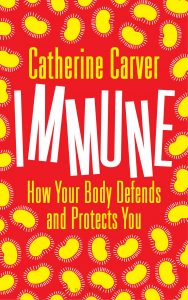Book Reviews
A Look Into Mankind’s Oldest, Fiercest Ongoing Battles – Inside Us

Vikas Datta | IANS
Title: Immune; Author: Catherine Carver; Publisher: Bloomsbury Sigma; Pages 288; Price: Rs 499
Picture a mighty fortress besieged by a huge array of cunning invaders, some of whom have even managed to enter and entrench themselves by a range of subterfuges. But then, its defenders are mostly equal to repelling them with a variety of approaches – isolating them, cutting off their supply, or even gobbling them up or disintegrating them.
As some may have gathered, this fortress is the human body, the invaders pathogens that attack it at every conceivable opportunity and in every conceivable action “from having sex to cleaning the kitchen sink”, and the indefatigable defenders, in various shapes, sizes and operating methods, come from our resourceful immune system.
“Every epic tale needs a hero. Ours is 12 microns tall and lives for a matter of hours; it’s called a neutrophil and your live depends on it. Don’t be deceived by its tiny stature and miniscule lifespan; this cell can capture bubonic plague in a web of its own DNA, spew out enzymes to digest anthrax and die in a kamikaze blaze of microbe-massacring glory,” says doctor and science populariser Catherine Carver in this fascinating overview of the immune system.
She starts with the more evident body defences like the skin, the lungs which deal with the 10,000 bacteria we suck in with each inhalation of breath (smoker’s cough is also a defence mechanism), our stomach with its powerful acid, as well as less obvious candidates like tears, snot and earwax, before going inside into the system in earnest.
But Carver does not however only deal with “ninja” neutrophils, or “mega-munching” macrophages, or the “beautifully-named” natural killer cell, which unlike the earlier two, deals with the invaders who make it to the inside of the cells, but goes on to reveal many other facets of the immune system, beyond its defensive role for the body.
She goes to take up organ and other implants, both crucial or cosmetic, and what the system can do to them – and by extension, to our continued existence. Or for that matter, the system’s relation with the billions of beneficial bacteria among us – and a special bank, which deals in our solid waste, to remedy any deficiency, including those caused by indiscriminate use of antibiotics.
After that rather sordid episode, Carver then deals with the more agreeable – and much vital – issue of the system’s role in influencing sexual relations and even love (with plenty of telling anecdotes of research and droll comparisons), and follows it with the quite inevitable issue of pregnancy, where the foetus may be seen by the system as another alien body but is actually welcomed and cossetted by it.
Subsequent chapters take up bigger, and more horrific, parasites that seek to nestle in us and how our assiduous defender deals with them, antibodies and vaccines, as well as its darker side as manifested in allergies, or when it goes rogue or becomes to weak to perform its duty.
There are its major adversaries – cancer and why it is such a major challenge and what we are doing about it, as well as two mass killers – anthrax and Ebola which should make us “very afraid” even as Carver ends on a note of hope with the drugs that seek to replicate the immune system’s powers and performance to “save us from the nightmare of the antibiotic apocalypse”.
Carver, who studied Medicine at the University of Aberdeen, worked with TB/HIV sufferers in Tanzania and then in British hospitals before moving to public health and public health policy, takes us on a fascinating journey to the battleground inside us.
And while there is a lot of complicated science – from the complement system of proteins in blood and cell surfaces to the alphabet jumble of cytokinases, she enlivens the lucid and relatable account (with many pop culture references or drawn from news, eg telling us animal organ transplants will require us a system of surveillance that will startle Edward Snowden) with sparkling wit and humour.
But above all, it is most informative about the titanic struggles going inside us and how they affect us, personally and collectively, in ways we are never aware of. In this respect, its a thriller we cannot ignore.
(Vikas Datta can be contacted at vikas.d@ians.in)

